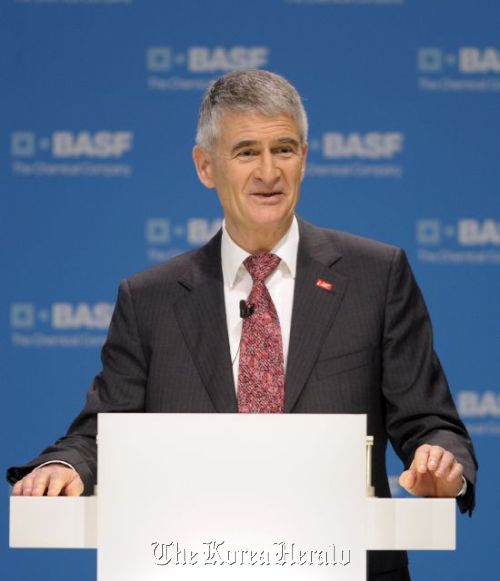 |
BASF chief executive Jurgen Hambrecht speaks during the firm’s yearly press conference in Ludwigshafen, Germany on Thursday.(BASF) |
LUDWIGSHAFEN, Germany ― Leading global chemical firm BASF plans to expand its presence in Asia by investing 2.3 billion euros ($3.1 billion) over the next five years, company officials said Thursday.
The Germany-based firm’s aggressive investment plan comes as the Asia-Pacific market has been boasting robust growth in recent years on high demand, according to BASF.
“Asia-Pacific is already today the largest chemical market on the globe and we expect the positive development in the region to continue,” Martin Brudermuller, BASF’s board of director in charge of Asia-Pacific, told reporters.
The increasing significance of the Asian market to the chemicals producer can be seen from its contribution to the record results the firm attained last year.
The BASF posted sales of 63.9 billion euros in 2010, up 26 percent from a year earlier, and earnings of 4.5 billion euros, the firm said.
Chief executive Juergen Hambrecht said BASF’s profit more than doubled last year as demand from the automotive and chemicals industries bounced back thanks to the global economic recovery.
Sales from the Asia-Pacific market marked for 12.5 billion euros, up 46 percent from a year before.
The BASF is hoping to continue such an upbeat trend in the region in future, aiming at growing 2 percent points faster than the regional chemical market annually by 2020, it said.
The firm has so far been making great strides toward realizing the long-term strategy, Brudermuller said.
“We plan to continue our above average growth based on an even stronger regional production platform,” he added.
Major projects include production site expansions in Malaysia and China, the firm said.
It is considering a 1 billion euro-joint venture in Malaysia with Petronas, state-owned oil and gas company, and a $1 billion joint venture in Nanjing, China in collaboration with the country’s state-run oil and gas firm Sinopec, officials said.
Meanwhile, Brudermuller discussed the firm’s business in Korea, saying that the country still remains an “important production base” despite its latest focus on the Chinese market.
“Although China accounts for half of the Asian market, we have an important production base in Korea and export a lot of goods from Korea to regional markets,” he said, adding that he sees a lot of future opportunities in the market.
The businesses portfolio of world’s largest chemicals firm ranges from chemicals, plastics, agricultural products to oil and gas.
The BASF Korea Co., a wholly-controlled subsidiary of BASF, operates manufacturing plants in Ulsan, one of the seven largest cities in Korea, as well as Yeosu in South Jeolla Province, Gunsan in North Jeolla Province and Ansan in Gyeonggi Province.
By Koh Young-aah (
youngaah@heraldcorp.com)
(Korea Herald correspondent)
